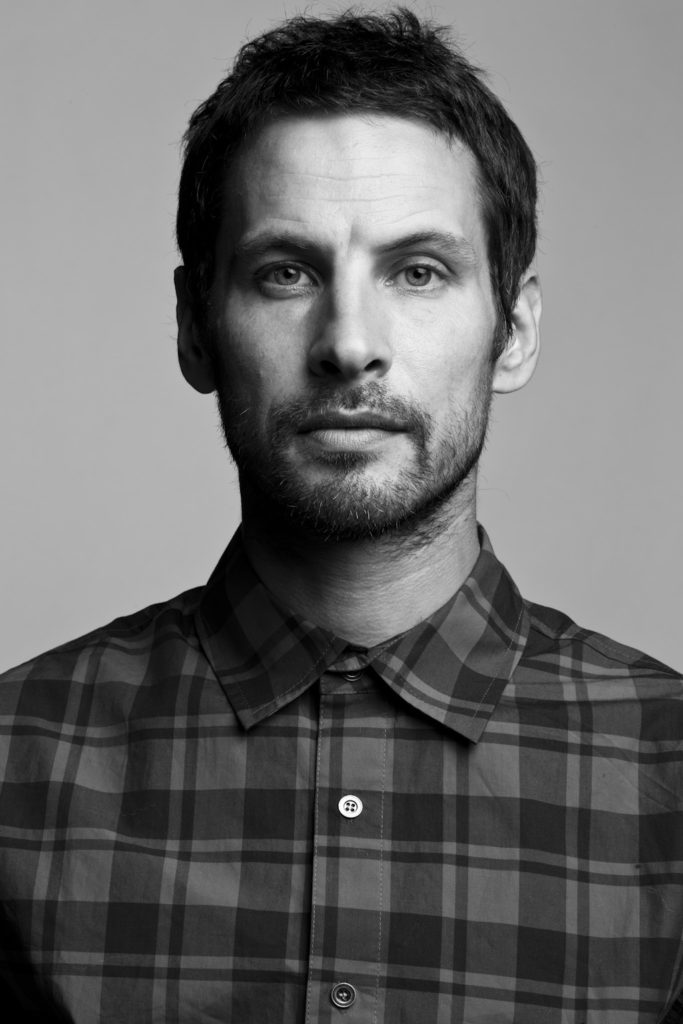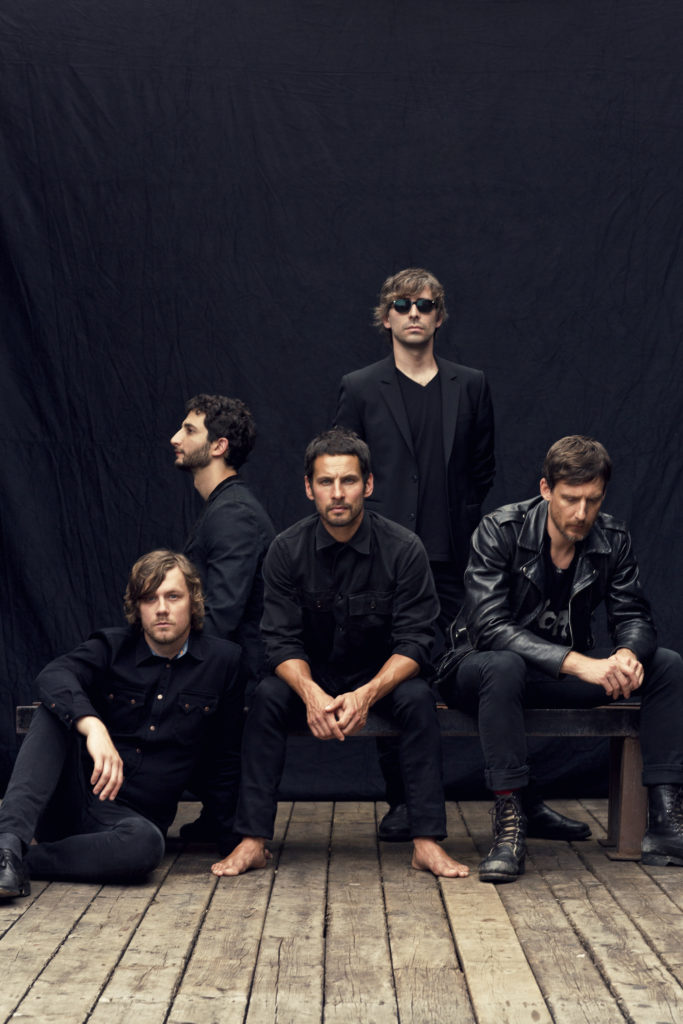
Fans of the Sam Roberts Band have reason to rejoice: the finishing touches are being put on new album from the popular Canadian rock outfit – the first new music coming from the talented quintet since the special Counting the Days EP in 2015 and the first full-length album since 2014s Lo-Fantasy.
Aficionados of the group living in Belleville will get a chance to hear some of the new material including the first single, If You Want It, as the Sam Roberts Band headlines the first night of the annual Empire Rockfest outdoor music festival, hitting the downtown stage on Thursday, July 21. Popular area rockers The Glorious Sons will be opening. Sam Cash & The Romantic Dogs is also on the bill. There is another major local connection, as the new, as-yet-untitled album was recorded just outside Kingston, at the Bathhouse Studio.
“We recorded it at The Tragically Hip’s studio and it’s a place that we’ve made music before. Graham Walsh from H*ly F*ck was the producer and he did a great job. We holed ourselves up there at the Bathouse for the month of March to record the tracks and then we have basically been working on it ever since to get ready for release,” Roberts said, adding that he realizes that the notion of the whole band spending the entirety of the recording process under one roof is decidedly old school in the age of file sharing and other computerized recording wizardry. But it’s a process that works for them.
“I think a lot of bands don’t want to be closeted away together under one roof. They want to go in and do their individual sessions, and those are bands that are more made up of individuals. Our band is certainly a collective, and I think we enjoy spending that kind of time together and having the recording experience being defined as one that we lived through together. I guess we believe in some way that the music that’s created is sort of a reflection of that experience and it comes across in the songs created at that time.
“We still want to go and mark the time and mark the experience together. And maybe it’s just our own perception of the music but there’s this feeling that, yeah in that sharing of not just the process but the actual living space, the time and the place, that there is a spirit that works its way into the music itself.”

There has always been a unique spirit that has infused the music of the Sam Roberts Band, which is also comprised of lead guitarist Dave Nugent, keyboardist Eric Fares, bassist James Hall, and drummer Josh Trager. It’s highlighted by melodies that are infectious, lyrics that are deep and somewhat enigmatic, but memorable, and a live show that just plain rocks.
Roberts was born in Montreal to South African immigrants, and raised surrounded by a plethora of musical influences, somewhat outside the norm of most kids he grew up alongside.
“Everything under the sun was happening all at once in my house. I grew up with classical music and was into that probably more than anything else when I was young. There were really no boundaries in terms of what as defining our family musically. What did define us was that we were pretty open minded and I think, thankfully, my parents’ African upbringing really marked our family in that we never really sought boundaries between shards and genres of music like kids who of a more North American mindset did,” he said.
Roberts started playing in bands in high school and got more serious while a student at his hometown McGill University. When his band Northstar broke up in 1999, he worked to establish himself as a solo artist, releasing the homemade demo Brother Down followed by the EP The Inhuman Condition and released on his own independent imprint. After signing with MapleMusic two singles from the EP, a re-recorded version of Brother Down and Don’t Walk Away Eileen became hits, leading to a major record deal with Universal Music Canada. His first full album was 2003s We Were Born in a Flame, with the hit singles Where Have All the Good People Gone? And Hard Road.
By this time he had built a band around him, preferring the collective approach to writing, recording and performing. Over the past few years he has billed everything created by the group under the Sam Roberts Band banner.
Chemical City came out in 2006 with the debut single The Gate hitting number one on Canadian radio. Love at the End of the World followed in 2008 and Collider came along in 2011. Along the way, Roberts and his band were nominated for a phenomenal 13 Juno Awards, winning six including for Album of the Year, Artist of the Year and Rock Album of the Year for We Were Born in a Flame, as well as Artist of the Year and Rock Album of the Year in 2009 for Love At The End of the World.
The band has also been nominated for 14 MuchMusic Video Awards, winning five.
The key to the success, Roberts believes, is that the band has steadfastly stuck to its artistic guns and consistently works to make a better album each time out.
“Every song obviously calls for its own consideration. But another factor is the time in your life when you happen to be writing or making music. I am not the same as I was three years ago. A lot’s happened to me, and the band, and these new songs are a reflection of that. I think the challenge for our band is to still deliver the music with a sense of spontaneity, a sense of urgency and I think that when we go into a new record, we sort of loosen the grips of other people’s expectations and our own expectations,” he said.
“The question always is how are we going to do, not necessarily justice to the music, but how are we going to go and actually record this and put this music down forever with that kind of spirit? That to me is the challenge and will remain the challenge and it will be the challenge for the next record and any subsequent records that we ever make. It’s certainly been the challenge in the past.
“When it comes down to it, creating music is about getting rid of all the shit we carry and bring into the writing and recording process – all the baggage and all the things that you’ve lived through and all the things that you wished you were living through. I hope that it’s not just us, but other bands as well that feel the same way about making music. I think that’s how all of my favourite records have been made.”

The music of the Sam Roberts Band isn’t always easy to categorize either. It’s been often lumped in with other alternative or alternative rock bands, but there is also a substantial 1980s melodic rock vibe, mixed in with the best of 1990s Brit Pop.
“When our band really became a band we were listening to the Stone Roses or the Happy Mondays, The Smiths, Primal Scream. At that time, in the 1990s you either went the grunge route or if you were myself and my like-minded friends, we were listening to a lot of the music coming out of England at the time,” he said.
“Going back further there was The Clash, Paul Simon and my mom and dad’s Bob Dylan and Pink Floyd Records too.”
Roberts also adheres to the belief that an album is still an important and viable way of creating and delivering music, yet at the same time, revels in the fact that there is a more egalitarian philosophy guiding most younger consumers of music, who are not bound by the necessities of sticking to one genre or another.
“My concern, especially as somebody who is still very much a proponent and an advocate of making albums, is that you now have to keep the attention span of listeners because people will now flip from a hip hop song to a pop song to a rock song to jazz or whatever it is in the space of 10 or 15 minutes. So how do you deliver the full picture to them? As much as I am also a proponent of that democratization and breaking down of barriers, I still wish that I could just slow everything down a little bit more towards how it was back in the day when you went and bought a record and invested not just your money but also had to invest time into it – time to really peel back the layers, time to really see the whole artistic picture. And I still think it’s a very pertinent and valid art form that way,” he said.
“And it’s cool that all of a sudden vinyl is a priority again, and people are looking for a sort of tangible, marketable way of putting out a record. Personally I think that ought to be encouraged in the younger generations, for lack of a better term. Even if there’s not a physical connection, at least encourage them to make the investment in time and thought when listening to a full record. There is something to be said about vinyl. You are a slave to the actual properties of the record itself: it can only hold so much information on one side, so you have to then get up and flip it over. You remain physically engaged in the process of listening to that record.
“It’s not just the push of a button. Playing a record sends you off on a different path and I think it’s an important thing. I still look for that as a music lover and as somebody who listens to a lot of music around the house especially. I do enjoy that physicality of the experience and the slowness, in a sense, of the experience. I don’t think you can expect everybody to turn back the clock and say that, hey we have found the ultimate expression in the form of vinyl. But it certainly is an alternative for the people who do recognize the importance of that experience.”
And seeing music live is also an important experience, one that Roberts also enjoys from both the perspective of an audience member and as an on-stage participant. Besides the show in Belleville on July 21, The Sam Roberts Band returns to The Kee to Bala on Sept. 3 and 4. They also play Edgefest in Buffalo on July 31 as well as other dates throughout Canada over the summer. For more information on tour dates and the new album, visit http://samrobertsband.com.
* Jim Barber is a veteran award-winning journalist and author based in Napanee, ON, who has been writing about music and musicians for a quarter of a century. Besides his journalistic endeavours, he now works as a communications and marketing specialist. Contact him at jimbarberwritingservices@gmail.com.
SHARE THIS POST: